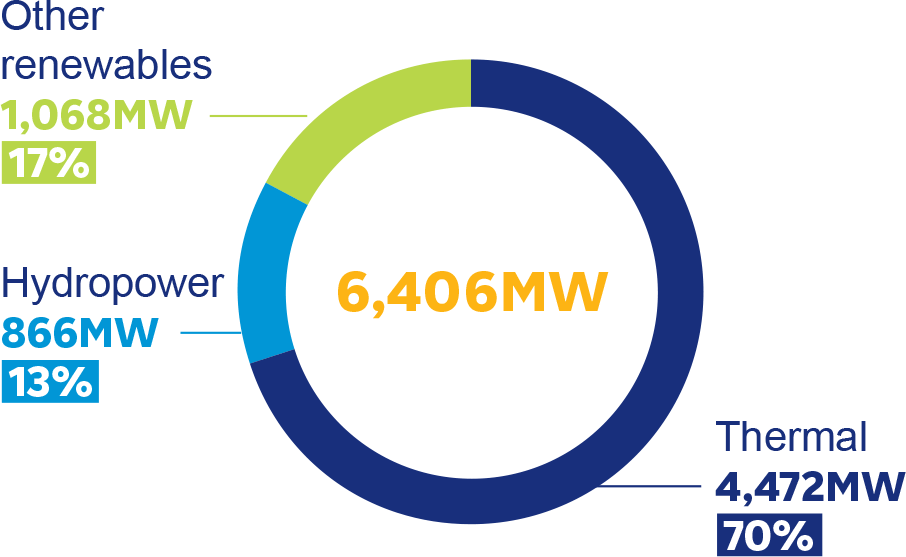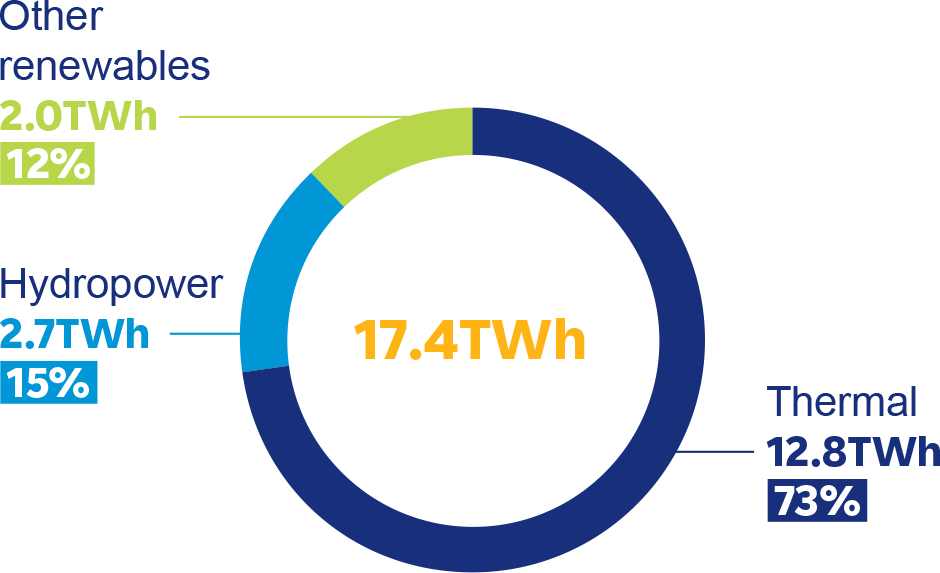During 2021, Edison pursued the implementation of its transformation strategy, designed to pursue its repositioning as a responsible leader in the context of energy transition, so as to reach its decarbonisation objectives, in accordance with the Italian PNIEC (Piano nazionale integrato per l’energia e il clima), the European Green Deal and the United Nations Sustainable Development Goals (SDGs). Therefore, Edison has adopted a sustainability policy based on the SDGs to work for the preservation of the environment and the improvement of the quality of life.
The company concentrated on streamlining and extending renewable generation, the construction of two latest generation gas-fired power plants with low CO2 emissions, the development of energy services, increase in the number of end customers and development of “green” gas.
On 17 December 2020 (1), Edison announced the disposal of its oil & gas exploration and production activities to Energean, excluding Algeria and Norway. Edison withdrawn entirely from this industry in Norway in March 2021, following the finalisation of the agreement for the disposal of 100% of Edison Norge AS entered into with Sval Energi on 30 December 2020.
In 2021, Edison has strengthened its social commitment and its approach based on joint planning and creation of shared value together with local communities and territories. With the creation of the EOS Corporate Foundation or Edison Orizzonte Sociale, Edison contributes to the objectives of the UN 2030 Agenda for Sustainable Development. Edison works in particular in the areas of education, social inclusion, reducing inequality and promoting sustainable communities.
In November 2021, Edison and Crédit Agricole announced the first securitisation transaction based on ESG criteria in Italy, which includes the setting of a sustainability indicator consistent with the company’s climate change targets.
Going forward, the main avenues of development are as follows:
- power generation: Edison aims to increase its renewable energy generation by promoting specific capital investments in hydro power, wind power and solar power projects to optimise its electricity generation portfolio in Italy and to reduce its carbon emissions so that it may reach 5GW capacity in 2030. Simultaneously, Edison aims to develop tools for managing flexibility such as additional storage capacity for intermittent unscheduled renewable energies. The increase in installed capacity of renewable energies will also include a share of green hydrogen production;
- service offering: Edison’s goal is to strengthen its position on the Italian market by means of an innovative offering, in particular through the development of energy services designed for the end customers, in particular for residential consumers and industrial, services, and public administration Edison aims to increase its market share by helping customers and territories increase their competitiveness, efficiency, environmental sustainability and individual well-being;
- gas: Edison is the EDF group’s gas Since 2017 the company has had a service agreement with EDF enabling it to provide integrated management of all assets and develop EDF’s upstream gas business (in particular the supply of gas and LNG, contract management, medium to long-term optimisation, transport, and storage). The Group also benefits from EDF Trading, responsible for asset optimisation, as well as from short-term operations on wholesale markets on the continent and in the UK.
In addition, Edison aims to develop the latest generation of gas-fired power plants to compensate for the intermittency of non-programmable renewable sources and reduce emissions. It also aims to be a key contributor to the development of green gases (H2 and bio-CH4).
Finally, Edison aims to ensure the competitiveness of gas supply and maintain a balanced mix of flexible contracts, by diversifying the sources of supply while adapting contracts to the pace of the energy transition.
The rating agencies have assessed Edison’s strategy favourably in 2021: Moody’s has upgraded Edison’s rating from Baa3 to Baa2 in view of the company’s improved industrial risk profile, earnings growth and cash flows. In August 2021, the agency raised the company’s outlook from negative to stable, following the upgrade of EDF’s rating. Standard&Poor’s upgraded Edison’s rating to BBB with a stable outlook due to strong operating results and favourable growth expectations.
In February 2022, Standard & Poor’s reviewed Edison outlook to negative from stable, following the downgrade of EDF by one notch to BBB with negative outlook. Moody’s also reduced Edison’s rating to Baa3/negative outlook. Standard & Poor’s and Moody’s both noted Edison’s strong underlying operating performance, its solid credit metrics, its improved business risk profile and the progresses made in Edison’s strategic repositioning.
1.4.5.2.3 Edison’s business
Installed capacity and output of Edison in Italy (1) – 2021
Installed capacity

6,406MW
- Other renewables 1,068MW 17%
- Hydropower 866MW 13%
- Thermal 4,472MW 70%
Electricity output

17.4TWh
- Other renewables 2.0TWh 12%
- Hydropower 2.7TWh 15%
- Thermal 12.8TWh 73%
(1) On a consolidated basis, including customer energy efficiency services.
NB : values are rounded up.
(1) See Edison’s press release of 17 December 2020.
